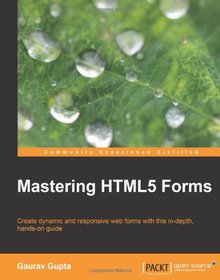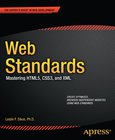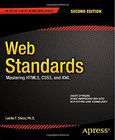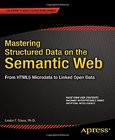Mastering HTML5 Forms

Book Details:
| Publisher: | Packt Publishing |
| Series: | Packt , Mastering |
| Author: | Gaurav Gupta |
| Edition: | 1 |
| ISBN-10: | 1782164669 |
| ISBN-13: | 9781782164661 |
| Pages: | 148 |
| Published: | Nov 22 2013 |
| Posted: | Nov 19 2014 |
| Language: | English |
| Book format: | |
| Book size: | 1.31 MB |
Book Description:
Create dynamic and responsive web forms with this in- depth, hands-on guide Overview Enhance the look and feel of your form Optimize your user experience for any device Utilize HTML5s brand new form elements In Detail HTML5 has given web developers the ability to easily develop sites and applications which, previously, were extremely time consuming. Now, they can not only build visually stunning forms and web pages, but can also increase the scope of their applications, as well as collect valuable user inputs and data through customized forms. This practical guide will teach you how to create responsive forms, and how to link them to the database. This will enable you to take advantage of the power behind HTML5 elements for building forms, and make the user interfaces attractive and more interactive. Explore the benefits of web forms, and learn how to create them using new HTML5 form elements. This guide will take you through a number of clear, practical examples that will help you to take advantage of the forms built and customized using HTML5 and related technologies, quickly and painlessly. Your ability to build responsive forms will be enhanced throughout the book.You will also learn about the necessity of validations, CSS3 properties for improving the look of the form, and how to link the form to the server. Lastly, you will learn to make the standard forms responsive by making them compatible with desktops and mobile devices. What you will learn from this book Get to grips with the new HTML5 form elements and attributes Add client-side validation to your forms using HTML5 attributes Discover form validation constraints and the supported APIs Style your forms using CSS3 Prevent spoofing and forging of the forms Utilize PHP and MySQL to store information in databases Understand responsive design techniques Approach This tutorial will show you how to create stylish forms, not only visually appealing, but interactive and customized, in order to gather valuable user inputs and information. Who this book is written for Enhance your skills in building responsive and dynamic web forms using HTML5, CSS3, and related technologies. All you need is a basic understanding of HTML and PHP.
Download Link:
Related Books:
Web Standards
Mastering HTML5, CSS3, and XML
Web Standards: Mastering HTML5, CSS3, and XML provides solutions to the most common website problems, and gives you a deep understanding of web standards and how they can be applied to improve your website. You will learn how to create fully standards-compliant websites and provide search engine-optimized Web documents with faster download times, accurate rendering, correct appearance and layout, lower development cost, approved accessibility, backward and forward compatibility, and easy maintenance and content updating. The book covers all major Web standards, focusing on syntax, grammar, recommended annotations, and other standardization concerns. Web Standards: Mastering HTML5, CSS3, and XML is also a comprehensive guide to current and future stan...
Web Standards
Mastering HTML5, CSS3 and XML
2nd Edition
Web Standards: Mastering HTML5, CSS3, and XML provides solutions to the most common web design problems, and gives you a deep understanding of web standards and how they can be implemented to improve your web sites. You will learn how to develop fully standards-compliant, mobile-friendly, and search engine-optimized web sites that are robust, fast, and easy to update while providing excellent user experience and interoperability. The book covers all major web standards for markup, style sheets, web typography, web syndication, semantic annotations, and accessibility. This edition has been fully updated with the latest in web standards, including the fi...
Mastering Structured Data on the Semantic Web
From HTML5 Microdata to Linked Open Data
A major limitation of conventional web sites is their unorganized and isolated contents, which is created mainly for human consumption. This limitation can be addressed by organizing and publishing data, using powerful formats that add structure and meaning to the content of web pages and link related data to one another. Computers can "understand" such data better, which can be useful for task automation. The web sites that provide semantics (meaning) to software agents form the Semantic Web, the Artificial Intelligence extension of the World Wide Web. In contrast to the conventional Web (the "Web of Documents"), the Semantic Web includes the "Web of Data", which connects "things" (representing real-world huma...
2007 - 2021 © eBooks-IT.org



